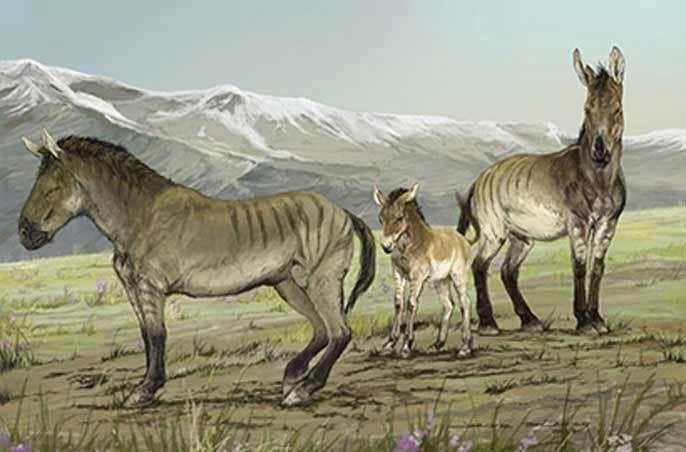
New Genus of Extinct Horse Discovered
The “New World stilt-legged horse” has been identified not as a subspecies of Equus, but as an entirely separate genus, now named Haringtonhippus francisci.

A family of stilt-legged horses (Haringtonhippus francisci) in Yukon, Canada, during the last ice age is depicted in this illustration Illustration by Jorge Blanco.
The fossil record may not look too dissimilar between Equus, which eventually led to the domestic horse we know today, and the newly-named Haringtonhippus francisci, but DNA analysis revealed that in fact they were two totally separate groups. The findings were published on November 28, 2017 in eLife.
Originally called the “New World stilt-legged horse,” Haringtonhippus francisci fossils have been found in Alaska, the Klondike area of Canada, Nevada, Wyoming and Texas. Fossilized metatarsal bones had been discovered in the 1970s by Richard Harington, after whom the horse is now named; while he did not work directly on this latest project to identify the stilt-legged horse he is honored for his initial discovery.
The stilt-legged horse is described as thin-limbed and lightly built; prior to this study, the stilt-legged horse was thought to be a relative to the Asiatic wild ass or onager, perhaps a subspecies of Equus. Studying the DNA preserved in the fossil record, however, proved that Haringtonhippus francisci diverged from the ancestors of Equus an estimated four to six million years ago.
Both groups of horse lived alongside each other widespread through North America and did not interbreed; both groups went extinct on this continent in the last ice age. Equus had since spread to Eurasia, but it was the end of the line for Haringtonhippus francisci.
Haringtonhippus francisci is not closely related to any living population of horses on the planet — but it’s fascinating to discover a previously-unknown chapter of equine evolution.
Read the full story at the University of California Santa Cruz website and check out the published study here. Go Haringtonhippus francisci, and go riding!






Leave a Comment